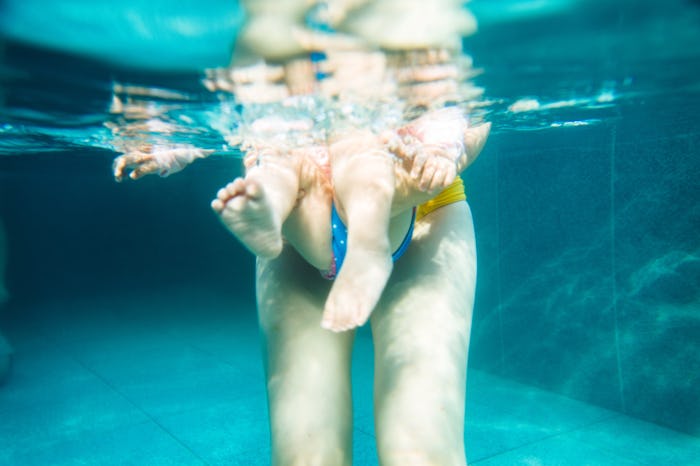Water Safety

The AAP Says Kids Should Start Swim Lessons At 1 To Minimize Drowning Risk
Learning to flip and float is a lifesaving skill.
So much happens when your baby turns 1. Maybe they’re beginning to walk, and you’re supposed to start taking them to the dentist, and apparently, it’s also the time to start thinking about swim lessons. That’s right — the American Academy of Pediatrics (AAP) actually recommends starting swim lessons as young as age 1, to protect against the risk of drowning. With all the summer fun by the water, it’s important to be teaching your child about water safety and minimizing their risk as much as possible this season.
Drowning is the leading cause of death for children 1 to 4 years old, and the rates of drowning deaths have risen in recent years. Child health and injury prevention experts agree that enrolling your child in swim lessons that focus on water competency strategies — things like floating or getting to the edge of the pool — can significantly reduce their risk of drowning. “The basic skill of learning how to flip and float is lifesaving, and can be taught to a child as young as 1. By teaching children what to do if they fall into the water, how to float and get air, and reach for the side of the pool, we can help avoid having an accident turn into a tragedy,” says Blake Collingsworth, founder of the Joshua Collingsworth Memorial Foundation, in a water safety briefing hosted by the National Drowning Prevention Alliance.
When it comes to keeping kids safe around the water, safety experts say you need multiple layers of protection. That means your pool at home has a four-sided fence around it, and the doors to get to it have alarms on them. Other layers of protection include supervision, having the right life jacket, and having a CPR-trained adult around, according to the NDPA. But the one layer that can travel from home to other pools and natural bodies of water is water competency.
“As a pediatrician, if I had to pick one layer of protection, the one that spans all the ways that you could end up in the water intentionally or unintentionally, all the different kinds of water that you could end up in, the one that's always with you is your water competency,” says Dr. Benjamin Hoffman, M.D., president of the AAP. “We have research that shows it drastically reduces the risk of drowning if they receive lessons about the time they start to walk. If they have basic water survival skills, the learning to flip and float, then you’ve got time to find them and get them out [of the water].”
What to look for in swim lessons for your 1-year-old
We’ve all seen the slightly stressful videos of infant swim lessons on our social media feeds, but the expert panel agreed that there’s not enough data about their safety or efficacy for them to say whether they help reduce drowning risk. For a 1-year-old (or older) child, if you’re wondering what to look for in a swim class, the NDPA has a free checklist on their website just for parents on the hunt. Adam Katchmarchi, PhD, executive director of the National Drowning Prevention Alliance, recommends parents ask the following questions:
- Where did the instructor get their training? Who is their certifying organization?
- What is their teaching style?
- What exactly can you expect them to learn? In what timeframe?
- Are there swim lesson scholarships available for kids in my area? This can be helpful if lessons in your budget aren’t working for your child, and you think a different school or private instructor could make a difference.
The “best” swim lessons are like the “best” car seat, says Hoffman — the best one is the kind that fits your child, your lifestyle, and that you’ll use (or, in this case, attend). Not all families can afford to choose their child’s instructor, or there may be limited availability where you live. In these cases, Hoffman recommends starting a conversation with your child’s swim instructor about what you can do to help the lessons resonate with your kid.
So, if you have a toddler on your hands, when will you be starting lessons? Summer is the perfect time to start since lessons double as a way to beat the heat.